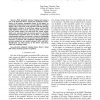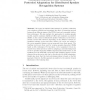81 search results - page 2 / 17 » Parallel Transformation Network features for speaker recogni... |
ICPR
2008
IEEE
13 years 11 months ago
2008
IEEE
One of the biggest challenges in speaker recognition is dealing with speaker-emotion variability. The basic problem is how to train the emotion GMMs of the speakers from their neu...
ICASSP
2010
IEEE
13 years 3 months ago
2010
IEEE
Prosodic information has been successfully used for speaker recognition for more than a decade. The best-performing prosodic system to date has been one based on features extracte...
ICASSP
2011
IEEE
12 years 8 months ago
2011
IEEE
Constrained cepstral systems, which select frames to match various linguistic “constraints” in enrollment and test, have shown significant improvements for speaker verificatio...
ICPR
2010
IEEE
13 years 2 months ago
2010
IEEE
Pitch mismatch between training and testing is one of the important factors causing the performance degradation of the speaker recognition system. In this paper, we adopted the mis...
ICBA
2004
Springer
13 years 10 months ago
2004
Springer
We apply the ETSI’s DSR standard to speaker verification over telephone networks and investigate the effect of extracting spectral features from different stages of the ETSI�...


